- Home
- P. D. James
The Lighthouse Page 13
The Lighthouse Read online
Page 13
“Had Mr. Oliver been particularly difficult during the last few days? Yesterday, for example?”
Maycroft glanced across at Dr. Staveley. The doctor said, “Yesterday was probably the unhappiest day Oliver had spent on the island. He had a blood test on Thursday—the blood taken by my wife, who’s a nurse. He asked for it to be done because he was complaining of being over-tired and thought he might be anaemic. It seemed a reasonable precaution, and I decided to ask for a number of tests on the sample. We use a private pathology service attached to the hospital at Newquay. The sample was lost overboard by Dan Padgett, who was taking some of his mother’s clothes to the Oxfam shop there. It was obviously an accident, but Oliver reacted violently. At dinner he was engaged in a furious argument with one of our visitors, Dr. Mark Yelland, Director of the Hayes-Skolling Laboratory, about his research work with animals. I doubt whether I have sat through a more uncomfortable and embarrassing meal. Oliver left the dining room before the meal was over, saying that he wanted the launch this afternoon. He didn’t say definitely that he intended to leave, but the implication was clear. That was the last time I saw him alive.”
“Who began the argument at dinner, Oliver or Dr. Yelland?”
Maycroft appeared to be thinking before he spoke, then he said, “I think it was Dr. Yelland, but you’d better ask him when you see him. My memory isn’t clear. It could have been either of them.”
Dalgliesh wasn’t inclined to make too much of Maycroft’s reluctance. An eminent scientist didn’t resort to murder because of a quarrel over dinner. He knew something of Mark Yelland’s reputation. Here was a man who was used to violent controversy about his chosen profession and no doubt had developed strategies for coping with it. It was unlikely that they included murder.
He asked, “Did you think Mr. Oliver was irrational to the point where he was mentally unstable?”
There was a pause, then Staveley said, “I’m not competent to give an opinion, but I doubt whether a psychiatrist would go that far. His behaviour at dinner was antagonistic but not irrational. Oliver struck me as a deeply unhappy man. It wouldn’t surprise me if he had decided to end it all.”
Dalgliesh said, “Even so spectacularly?”
It was Maycroft who spoke. “I don’t think any of us really understood him.”
Dr. Staveley seemed to regret his last statement. Now he said, “As I said, I’m not competent to give an opinion on Oliver’s state of mind. When I said that suicide wouldn’t surprise me, I suppose it was because he was obviously unhappy and anything else is inconceivable.”
“And what happened about Dan Padgett?”
Maycroft said, “I spoke to him, of course. Oliver wanted him dismissed, but there was no question of that. As I’ve said, it was an accident. It wasn’t a sacking offence and there would’ve been no point. I steeled myself to suggest that he might be happier if he found a job on the mainland. He said he’d already planned to leave, now that his mother had died. He’d decided to go to London and enrol for a degree at one of the newer universities. He’d already written for particulars, and apparently they weren’t much worried that he hadn’t any good A-levels. I told him he’d made a wise decision to leave Combe and make a new start. He’d come to the office expecting a reprimand, but he left more cheerful than I’ve ever seen him. Perhaps ‘cheerful’ is the wrong word—he was elated.”
“And there’s no one on the island who can be described as Oliver’s enemy? No one who might hate him enough to wish him dead?”
“No. I still can’t believe this is murder. I feel there must be some other explanation, and I hope you’ll succeed in finding it. In the meantime I suppose you want everyone to stay on the island. I think I can promise that the staff will be cooperative, but I have no control over our visitors—Dr. Raimund Speidel, a German diplomat and ex-Ambassador to Beijing, and Dr. Yelland—nor, of course, over Miss Oliver and Tremlett.”
Dalgliesh said, “I’ve no power at present to prevent anyone leaving, but obviously I hope they won’t. If anyone does, they’ll still need to be interviewed, but with less convenience and more publicity than if they’d stayed.”
Maycroft said, “Miss Holcombe has a dental appointment in Newquay on Monday morning. Apart from that, the launch will remain in harbour.”
Dalgliesh said, “How certain can you be that no one can land here unseen?”
“No one ever has in living memory. The harbour is the only safe landing place by sea. There are enough people in and around the house to keep a continual if not organised watch. As you’ll have seen, the entrance to the harbour is very narrow, and we have light sensors on each side. If a boat comes into harbour by night, the lights come on. Jago’s cottage is on the quay. He sleeps with his curtains drawn back and he’d wake up immediately. It’s never happened. I suppose there are about two places where someone could get ashore at low tide by swimming from an offshore boat, but I can’t see how he’d get up the cliff without an accomplice on the island, and they’d both need to be experienced climbers.”
“And who on the island is an experienced climber?”
It was obvious that Maycroft spoke with some reluctance. “Jago. He’s a qualified climbing instructor, and occasionally visitors he considers competent can climb with him. I think you can dismiss any suggestion that we have been harbouring an unwelcome visitor. It’s a comforting thought but it isn’t feasible.”
And it wasn’t only the problem of getting ashore. If Oliver had been lured to the lighthouse by someone who had gained access and perhaps hidden overnight, the killer would have had to have known that the lighthouse would be unlocked and where to find the climbing ropes. Dalgliesh had no doubt that the assumed murderer was one of the people on Combe, but the question of access had to be asked. It would certainly be raised by the defence if someone was brought to trial.
He said, “I’ll need a map of the island showing the cottages and their present occupants.”
Maycroft went over to the desk drawer. He said, “We’ve a number. Obviously visitors need them to find their way about. I think these will give sufficient details both of the buildings and the terrain.”
He handed the folded maps to Dalgliesh, Kate and Benton-Smith. Dalgliesh moved over to the desk and opened his map, and Kate and Benton joined him to study it.
Maycroft said, “I’ve marked the present occupants. The island is four and a half miles long and lies north-east to south-west. You’ll see from the map that it’s widest—about two miles—in the middle and tapers to the north and south. I have a flat here in the house and so do the housekeeper, Mrs. Burbridge, and the cook, Mrs. Plunkett. Millie Tranter, who helps Mrs. Burbridge, has accommodation in the converted stables, and so does Dennis Tremlett, Mr. Oliver’s copy-editor and secretary. Any temporary staff employed on a weekly basis from the mainland also stay there. There are none at present. There are two flats in the house for visitors who prefer not to occupy the cottages, but they’re usually empty, as they are now. Jago Tamlyn, who’s our boatman and looks after the generator, is in Harbour Cottage, at the harbour. Moving east, we have Peregrine Cottage, with Miss Oliver at present in it. Then, about three hundred yards further, is Seal Cottage, which is at present empty and which you yourself might wish to take. Beyond that is Chapel Cottage with Adrian Boyde, my secretary. It’s named after the square chapel which is about fifty yards to the north. The farthest south-east cottage is Murrelet, which Dr. Yelland at present occupies. He arrived on Thursday.
“Moving to the western shore, the most northerly cottage is Shearwater, where Dr. Speidel, who arrived last Wednesday, is staying. About a quarter of a mile south is Atlantic Cottage with Miss Emily Holcombe. Hers is the largest cottage and is semi-detached. Her butler, Arthur Roughtwood, lives in the smaller part. Then there’s Puffin Cottage, where Martha Padgett lived until her death two weeks ago. It’s one-bedded, so Dan had an apartment in the stable block. After his mother’s death he moved into the cottage to clear up her possessions. Finally, ther
e’s Dolphin Cottage, just north-west of the lighthouse.” He looked at his colleague. “That’s occupied by Guy and his wife, Joanna. Jo’s a nurse, and she and Guy looked after Martha Padgett until she died.”
Dalgliesh said, “You have at present six staff excluding Dr. Staveley. Surely that can’t be adequate when all the cottages are full.”
“We employ temporary staff from the mainland, mostly for cleaning. They come a week at a time. All have been with us for years and are reliable and, of course, discreet. They don’t usually work weekends, but we’re cutting down on visitors now because of keeping ready for the VIPs we’re told we should expect. You probably know more about that than do I.”
Was there a trace of resentment in his voice? Ignoring it, Dalgliesh went on, “I’d better have the names and addresses of the temporary workers, but it seems unlikely that they’ll be able to help.”
“I’m sure they won’t. They hardly ever saw the visitors let alone spoke to them. I’ll look up the records, but I think only two were ever here when Oliver was in his cottage. I doubt they set eyes on him.”
Dalgliesh said, “Tell me what you know about the people here.”
There was a pause. Maycroft said, “I’m in some difficulty. If there’s any suggestion that one of us is suspected of homicide, I ought to advise that he or she phones for a lawyer. I can’t act for them.” He paused and said, “Or, of course, for myself. My own position is invidious. The situation is difficult, unique.”
Dalgliesh said, “For both of us. Until I get the autopsy report I can’t be sure what I’m investigating. I expect to hear from Dr. Glenister sometime tomorrow. Until she reports, I’m assuming that this is a suspicious death. Whatever the outcome, it has to be investigated, and the sooner we get an answer the better for everyone. The bruise on Oliver’s neck, who first noticed it?”
The two men looked at each other. Guy Staveley said, “I think I did. I can’t be sure. I remember that when I first saw it I looked up at Rupert and our eyes met. I got the impression we were thinking the same thing, but neither of us spoke of it until we had taken the body into the sickroom and were alone. But anyone who saw the body could have noticed the bruising. Miss Oliver must have done. She insisted on seeing her father’s body and made me fold back the covering sheet.”
“And neither of you mentioned it to anyone else?”
Maycroft said, “I thought it important to discourage speculation until the police arrived. Naturally I expected that there would be an investigation of some kind. I went at once to the office and phoned the number I’d been given. They told me to close down the island and wait for further instructions. Twenty minutes later, they said you’d be on your way.”
He paused, then went on, “I know the people on this island. I know I’ve only been here for eighteen months, but it’s long enough to understand the essentials about them. The idea that any one of them could have murdered Oliver is bizarre. There has to be another explanation, however implausible it may seem.”
“So tell me what you know about them.”
“Mrs. Burbridge, the housekeeper, is the widow of a clergyman and has been here for six years; Lily Plunkett, the cook, for twelve. As far as I know, neither had any particular cause to dislike Oliver. Adrian Boyde, my secretary, is an ex-priest. He’d been away on leave and returned just before I arrived. I doubt whether he’s capable of killing a living creature. I expect you know about Emily Holcombe. As the only living member of her family, she has a right to stay here under the provision of the Trust, and she brought her manservant, Arthur Roughtwood, with her. Then there’s Jago Tamlyn, the boatman and electrician. His grandfather once worked as boatman here on Combe.”
Kate asked, “And Millie Tranter?”
“Millie’s the only young person on our staff, and I think she enjoys the distinction. She’s only eighteen. She helps Mrs. Plunkett in the kitchen, waits at table and makes herself generally useful to Mrs. Burbridge.”
Dalgliesh said, “I must see Miss Oliver, if she’s feeling well enough to talk. Is anyone with her now?”
“Only Dennis Tremlett, Oliver’s copy-editor. Guy and I went together to break the news of Oliver’s death. Jo called in later to see if there was anything she could do. Dennis Tremlett is still there, so Miranda’s not alone.”
Dalgliesh said, “I’d like you both to come with me to the lighthouse. Perhaps you would ring the library and let the people waiting know that I’ll be with them as soon as possible. Or you might prefer to release them to get on with what they were doing and call them together when I’m ready.”
Maycroft said, “I think they’d prefer to wait. Before we leave here, is there anything else you need?”
“It will be helpful if we could have the use of the safe. There may be exhibits requiring safekeeping until they can be sent to the lab. I’m afraid it will mean changing the combination. Will that be an inconvenience for you?”
“Not at all. The Trust deed and other important papers are not on the island. Information about our past visitors is, of course, confidential, but those papers will be as secure in the filing cabinets as they are in the safe. It should be large enough for your needs. I sometimes wonder if it was built to hold a body.”
He flushed as if suddenly aware that the remark had been singularly inappropriate. To cover the moment of embarrassment, he said, “To the lighthouse.”
Benton opened his mouth to comment, then closed it promptly. Probably he had been about to make reference to Virginia Woolf but thought better of it. Glancing at Kate’s face, Dalgliesh felt that he had been wise.
5
* * *
Dalgliesh, his two colleagues, Maycroft and Staveley left the house by the front door and took the narrow path along the cliff edge. Dalgliesh saw that about fifteen feet below was the lower cliff he had first seen from the air. Viewed from above, the narrow plateau looked as foliate as a planned garden. The patches of grass between the rocks were bright green, the huge boulders with their planes of silvery granite looked carefully placed and there hung from the crevices a profusion of yellow-and-white spongy-leaved flowers. More prosaically, Dalgliesh noted that the under-cliff offered a concealed route to the lighthouse for anyone agile enough to clamber down.
Maycroft, walking between Dalgliesh and Kate, gave an account of the restoration of the lighthouse. Dalgliesh wondered whether this volubility was a defence against embarrassment or whether Maycroft was attempting to impose some normality on their walk, as if speaking to more conventional and less threatening visitors.
“The lighthouse was modelled on the famous one by Smeaton which was taken down in 1881 and rebuilt on Plymouth Hoe as a monument to him. This is just as elegant and almost as high. It was neglected after the modern lighthouse was built on the north-west tip of the island, and during the last war, when the island was evacuated, it suffered a fire that destroyed the three upper storeys. After that it was left derelict. It was one of our visitors, an enthusiast for lighthouses, who gave the money for its restoration. The work has been done with remarkable attention to detail and, as far as possible, is a model of the lighthouse as last used. The working lighthouse is run by Trinity House and is automatic. The Trinity House boat arrives to inspect it from time to time.”
And now they had left the path and were walking up an encircling grassy mound and then descending to the lighthouse door. It was of stout oak with an ornamental knob almost too high to reach, an iron latch and a keyhole. Dalgliesh noted, as he knew would both Kate and Benton-Smith, that the door would not be visible beyond the grassy mound. The lighthouse was even more impressive seen now than from a distance. The slightly concave and glistening walls, as bright as if newly painted, rose some fifty feet to the elegant superstructure containing the light, its sectioned walls rising to a roof shaped like a mandarin’s hat topped with a bobble and weather vane. The whole top edifice, which looked eccentrically naÏve and childlike, was painted red and surrounded by a railed platform. There were four narrow paned
windows high above the door, the top two so small and distant that they looked like peepholes.
Pushing open the heavy oak door, Maycroft stood aside and let Dalgliesh and the rest of the party enter first. The circular ground-floor chamber was obviously used as a storeroom. There were half a dozen folding chairs stacked to one side and a row of pegs from which hung oilskin jackets and waders. To the right of the door was a heavy chest and, above it, six hooks holding climbing ropes, five of which had been meticulously coiled. The sixth, on the final peg, hung loosely, its dangling end twisted into a loop no more than six inches wide. The knot was a bowline with above it two half-hitches, an odd combination. Surely anyone capable of tying a bowline would have had confidence in its ability not to slip. And why not initially make the noose using a single slipknot at one end of the rope? The complicated method used suggested someone either inexperienced in handling a rope or so confused or agitated that he wasn’t thinking coherently.
Dalgliesh said, “Do this loop and knot look as they did when you first saw them after the body had been taken down?”
It was Staveley who replied. “Exactly the same. I remember that it looked clumsy, and I was surprised Oliver knew how to tie a bowline.”
“Who rewound the rope and replaced it on the hook?”
Maycroft said, “Jago Tamlyn did. As we started to wheel the stretcher back to the house, I called back to tell him to see to the rope. I told him to put it back on its hook with the others.”
And with the door unlocked the rope would be accessible to anyone who needed to tamper with it. It would be sent to the laboratory in the hope, if not of prints, of DNA from sweaty hands. But any such evidence, even if decipherable, was already compromised.

 The Skull Beneath the Skin
The Skull Beneath the Skin A Taste for Death
A Taste for Death The Children of Men
The Children of Men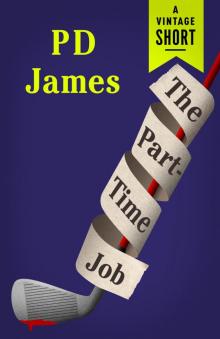 The Part-Time Job
The Part-Time Job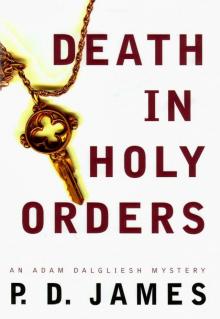 Death in Holy Orders
Death in Holy Orders The Victim
The Victim Shroud for a Nightingale
Shroud for a Nightingale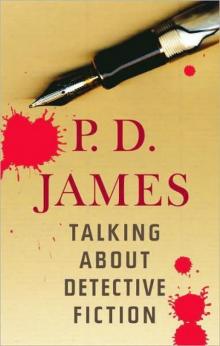 Talking about Detective Fiction
Talking about Detective Fiction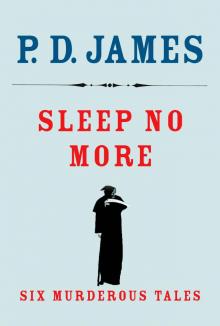 Sleep No More
Sleep No More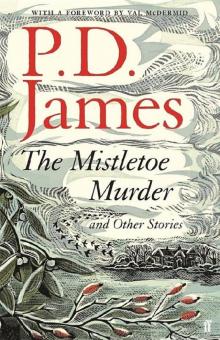 The Mistletoe Murder and Other Stories
The Mistletoe Murder and Other Stories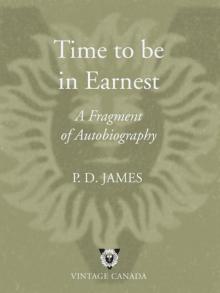 Time to Be in Earnest
Time to Be in Earnest Original Sin
Original Sin A Mind to Murder
A Mind to Murder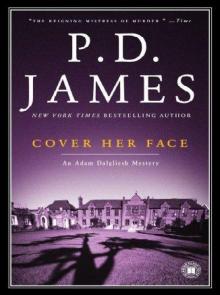 Cover Her Face
Cover Her Face Innocent Blood
Innocent Blood Devices and Desires
Devices and Desires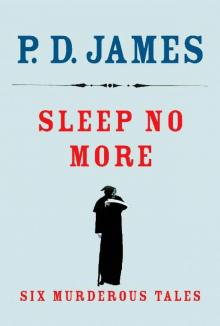 Sleep No More: Six Murderous Tales
Sleep No More: Six Murderous Tales Death Comes to Pemberley
Death Comes to Pemberley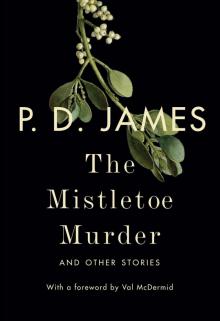 The Mistletoe Murder
The Mistletoe Murder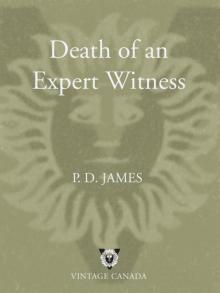 Death of an Expert Witness
Death of an Expert Witness The Private Patient
The Private Patient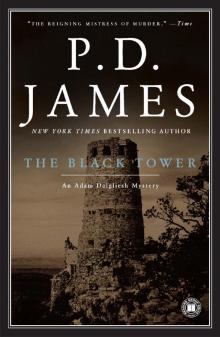 The Black Tower
The Black Tower Devices & Desires - Dalgleish 08
Devices & Desires - Dalgleish 08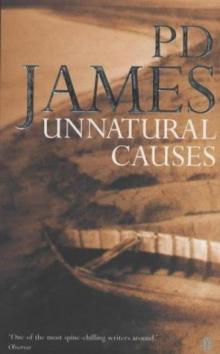 Unnatural Causes
Unnatural Causes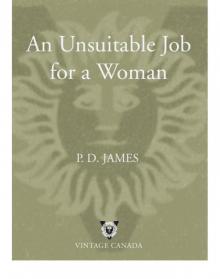 An Unsuitable Job for a Woman
An Unsuitable Job for a Woman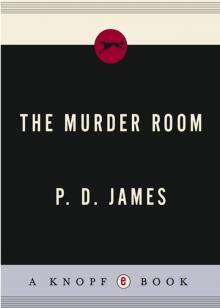 The Murder Room
The Murder Room A Certain Justice
A Certain Justice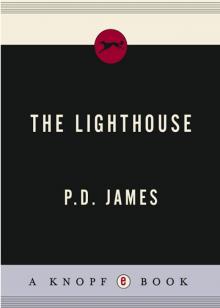 The Lighthouse
The Lighthouse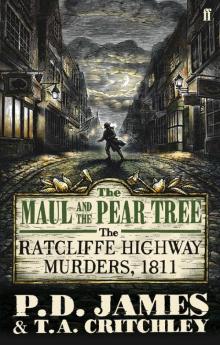 The Maul and the Pear Tree
The Maul and the Pear Tree